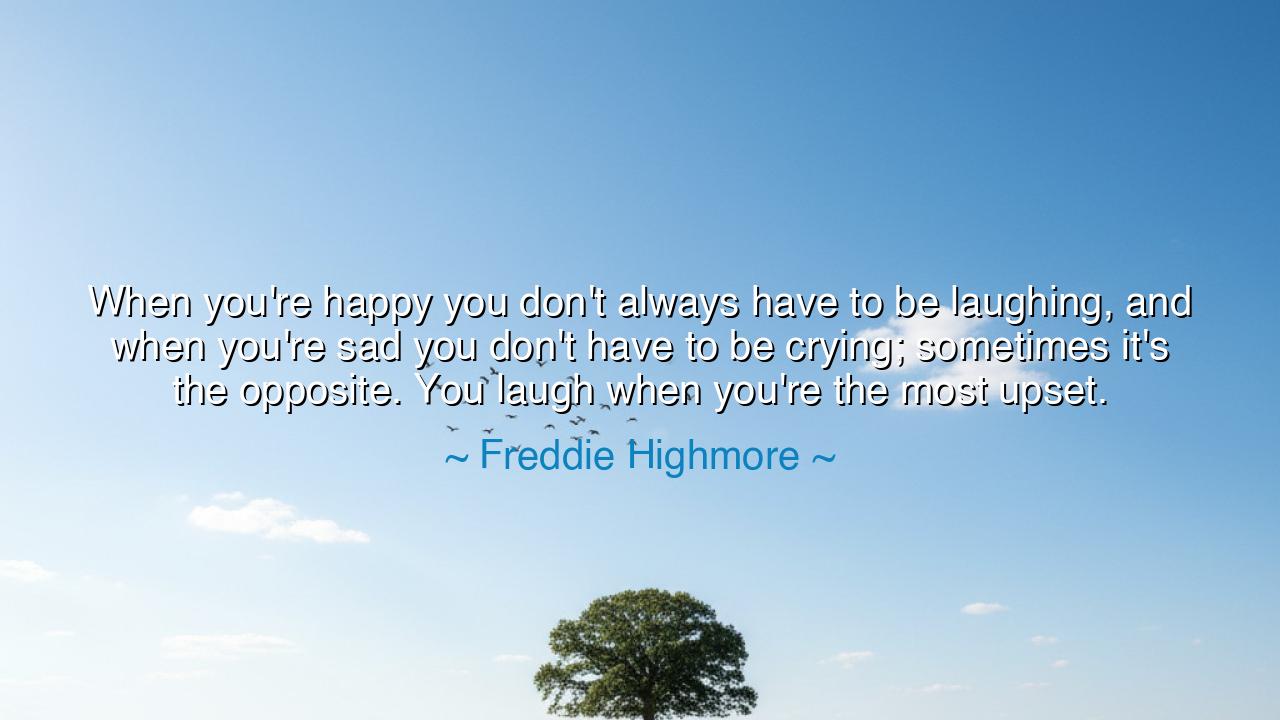
When you're happy you don't always have to be laughing, and when
When you're happy you don't always have to be laughing, and when you're sad you don't have to be crying; sometimes it's the opposite. You laugh when you're the most upset.






Hear, O children of the heart, the words of Freddie Highmore, who in his youth spoke a truth that echoes across the centuries: “When you're happy you don't always have to be laughing, and when you're sad you don't have to be crying; sometimes it's the opposite. You laugh when you're the most upset.” This utterance is not a riddle but a revelation of the mystery of the soul, for human emotions are not bound by simple signs. The heart often speaks in paradox, and its deepest feelings emerge not in what is seen, but in what is hidden beneath the surface.
The meaning of this truth lies in the complexity of the spirit. The world expects that joy will always burst into laughter and that sorrow will always flow as tears. But the soul is not so easily commanded. At times, joy is silent and still, like the quiet of dawn before the sun breaks forth. At times, grief is masked with laughter, for the heart, unable to bear its burden openly, seeks refuge in the disguise of mirth. Thus, to understand others—and ourselves—we must learn to see beyond the surface, to hear the hidden cry beneath the smile, and to perceive the quiet joy behind the tear.
History tells us this paradox again and again. Consider Abraham Lincoln, who carried the sorrow of personal loss and the weight of a divided nation upon his shoulders. Yet, in the darkest days of the Civil War, he was known for his humor and quick wit, often telling stories that brought laughter even to those drowning in despair. His laughter was not born of lightheartedness, but of survival. In his jests, he concealed the heaviness of his spirit, and through them he found the strength to endure. Here is Highmore’s truth embodied: laughter can be the mask of deepest grief.
Likewise, think of the ancient Greek tragedians, who understood that comedy and tragedy are bound together. Aristophanes and Euripides alike revealed that man laughs at the absurdities of life precisely because he knows its sorrows. The fool who laughs is often closer to wisdom than the one who weeps, for he sees the fragility of existence and finds in laughter both defiance and relief. Laughter in sorrow is not falsehood, but a testament to the resilience of the soul.
Yet, the opposite is also true: joy is not always loud. The mother who watches her child sleep, the farmer who beholds a field ready for harvest, the poet who finishes a line of beauty—these moments of happiness are not always accompanied by laughter, but by a deep silence filled with peace. The heart knows when joy must roar, and when it must whisper. To measure happiness only by outward laughter is to mistake the still waters for emptiness, when in truth they are full.
The lesson is profound: never assume you know the heart of another by its outward signs. The smile may conceal despair, and the tear may flow from overwhelming joy. Learn to listen more deeply, to show compassion without judgment, and to honor the mystery of human feeling. For emotions are not mechanical—they are rivers, twisting and turning, flowing where the eye cannot see.
As for practical action, approach others with gentleness. When someone laughs, do not always assume they are happy—listen to the tone, the silence that follows. When someone cries, do not always assume they are broken—sometimes tears are the overflow of gratitude or joy. In yourself, accept the paradox: do not be ashamed if you laugh in grief or sit silent in happiness. These are not contradictions, but proofs of your humanity. Keep your heart open to its full spectrum, and you will live more truthfully and love more deeply.
Thus, Highmore’s words remain as wisdom for all: “You laugh when you’re the most upset.” In that paradox lies the resilience of man, who weaves joy and sorrow into one tapestry, refusing to let despair have the final word. For to laugh in sorrow is to declare that the spirit is unbroken, and to sit silently in joy is to honor its sacred depth. This is the mystery of the heart, and the truth of being fully alive.






AAdministratorAdministrator
Welcome, honored guests. Please leave a comment, we will respond soon